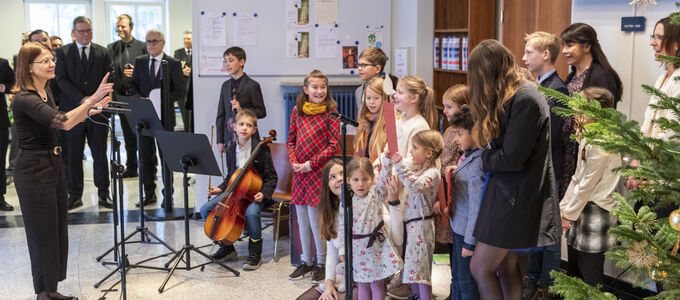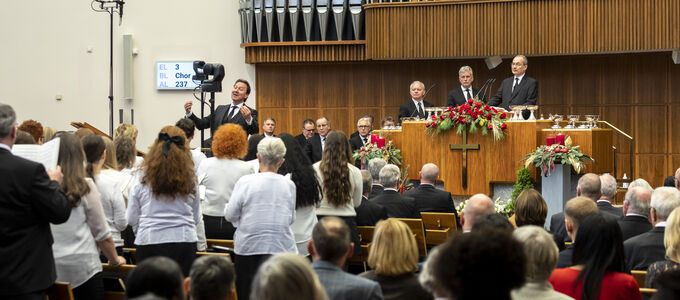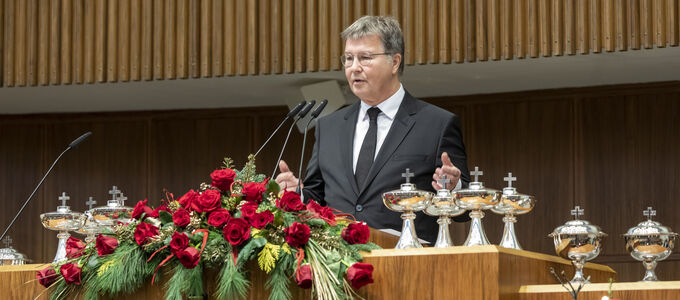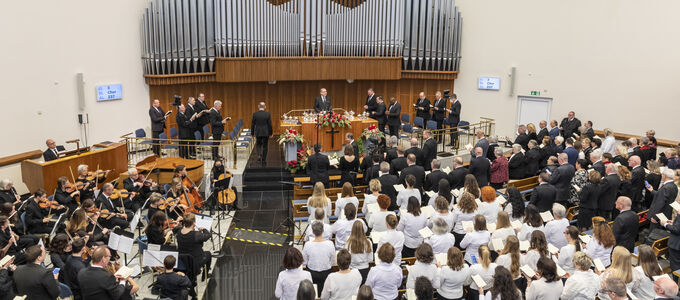
People celebrate Christmas and Easter. Is there more behind it than tradition? People are aware of the problems and know how to solve them. So who really needs a Saviour? There is, however, only one path that leads to lasting happiness and peace.
“And we have seen and testify that the Father has sent the Son as Saviour of the world.” This was the Bible text from 1 John 4: 14 for the divine service in Wiesbaden, Germany on 11 December 2022.
“The sensitivity for it is diminishing,” Chief Apostle Jean-Luc Schneider said and meant people’s understanding, even among Christians, of really needing Jesus Christ as their Saviour. Some are doing well, he said. Others see problems and have a solution, yet God is not part of the solution. And then there are those for whom the idea of faith is merely an empty promise to give hope to the simple and the poor.
However: “You cannot attain perfect and lasting satisfaction in this world with earthly goods and earthly things.” There is only one way to achieve lasting happiness.
The only way
“You can only have this once you have fellowship with God.” In order to achieve this you have to be exactly as God wants you to be, the Chief Apostle made clear. “The problem is: we cannot do it. We cannot do it alone! We need a Saviour!”
We need a Saviour, and that Saviour is Jesus Christ, the Chief Apostle explained. The Son of God, who came to earth, conquered evil and created access to God. This is our Saviour. With His help we can become as God wants us to be so that we are fully in line with the will of God. And then we will be happy.
Indeed, God is love. God wants to save all human beings. And Jesus Christ is the Saviour for the whole world. But He has prescribed a path, and if you want to be saved you must follow that path. And that means believing in Jesus Christ and modelling your life on His example. “The Lord clearly said so.”
Examples that characterise our role model
“Let me just name three points from the life of Jesus Christ, three characteristic traits,” the Chief Apostle outlined.
- He had a strong connection with God. Throughout His life, Jesus went to the temple or synagogue to meet God. And He always sought a connection with God in prayer.
- He always submitted to the will of His Father. He struggled and was willing to give up everything because oneness with His Father meant everything to Him.
- He did not come to rule, but to serve. He served without stipulating any conditions, without expecting anything in return, and without concern for success or failure.
“Indeed, Jesus Christ was perfect. We are not perfect. We are incapable of this.” The bottom line is: “There again we need a Saviour, a Redeemer.” What human beings cannot accomplish, Christ complements with His grace.
Serious questions we need to ask ourselves
“He expects only one thing from us: that we are thoroughly honest and strive earnestly for this,” the Chief Apostle explained. “That’s where we all—starting with me, and I take this very seriously—have to always ask ourselves, Where do I stand?”
- What about our church attendance? “You can do whatever you want. It’s up to you. You don’t owe us an explanation: not the Church leadership, not the Chief Apostle, not the rector, but Jesus Christ expects one.”
- How serious can our effort be to do the will of God when perhaps for years we have been clinging to an opinion, a view, or an idea and know deep within ourselves that the Lord Jesus sees it differently, but we are adamant and still cling to it?
- “How honest is your desire to serve God if you cannot bring yourself—excuse me for saying this so bluntly—to go to divine service to praise and worship God? You only come when you get something, when you need something. But you could also come and participate sometimes so that others can experience a divine service.”
“The Saviour will complete His mission,” Chief Apostle Schneider said in conclusion. “Our mission is simply to ensure that salvation can continue to be offered, that the gospel can continue to be preached. And if people do not want to hear it today, they should have the opportunity to hear it tomorrow or the day after; but the fire must be kept burning. This is what we have been called for: to serve others.”




























